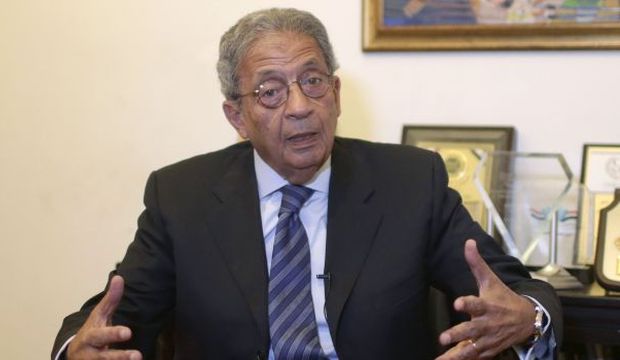
Former Egyptian foreign minister and presidential candidate Amr Moussa speaks during an interview with Reuters in Cairo, Egypt on March 11, 2014. (Reuters/Asmaa Waguih)
Cairo, Asharq Al-Awsat—Veteran Egyptian politician and former Arab League chief, Amr Moussa, called for a public debate in Egypt on the possibility of using military force against Islamist extremists in Libya on Sunday.
Moussa issued a statement over the weekend saying that Egypt’s “right to self-defense” against extremists in Benghazi and eastern Libya should be considered, as the situation in the country was a cause of great concern for Egypt and other neighboring states.
He went on to blame “foreign intervention” for the growing instability in Libya and the “failure” of the popular uprising that overthrew longtime dictator Muammar Gaddafi, and said the Egyptian public should be informed of the risks of intervention, in case it proves necessary.
Libya’s transitional authorities have been unable to restore order in Libya following the toppling of Gaddafi three years ago. Violence has worsened in recent weeks, with different armed factions fighting for control of Benghazi and Tripoli International Airport, leaving dozens dead.
Many foreign countries have evacuated their citizens and diplomats and shut down their embassies in Tripoli in response.
Moussa said: “The statelets, factions and extremists in Libya pose a direct threat to Egyptian national security.”
Egyptian workers in western Libya were forced to flee towards the Libyan–Tunisian border town of Ras Ejdir on Friday following an upsurge of violence in Tripoli. The Egyptian Foreign Ministry said it contacted Libyan authorities and tribal leaders to secure help for Egyptians on the Libyan side of the border with Tunisia.
Moussa’s spokesman, Ahmed Kamel, told Asharq Al-Awsat: “The threat of the establishment of [Islamist] statelets on the Egyptian border is no longer theoretical. It is a direct threat to Egyptian national security which requires Egyptians to be prepared should Egypt need to intervene to defend its national security.”
Kamel added: “Moussa has carefully assessed the situation in Libya and has identified the dangers represented by the establishment of sectarian statelets to the national security of neighboring states, and we must explain these dangers to Egyptians to prepare them for the possibility of direct Egyptian intervention.”
Kamel said Moussa called for unilateral action outside the umbrella of the Arab League because Egypt was “facing a direct danger which threatens our national security, and all countries which are near areas of tension that threaten their security do the same.”
Reactions in Cairo to Moussa’s statement varied, with some cautioning against unilateral Egyptian action in Libya, and others supporting the idea.
Dr. Mohammad Said Idris, head of the Arab and regional studies unit at the Al-Ahram Center for Political and Strategic Studies, warned that direct Egyptian intervention in Libya could drag Cairo into a quagmire.
Idris, who was previously secretary of the parliamentary Arab Affairs Committee, told Asharq Al-Awsat: “Egypt has the right and the duty to deploy its forces at the Libyan border to confront any attempts to harm its territory. However, directing a preemptive strike can drag Egypt into a quagmire that is beyond its capability [to deal with].”
Meanwhile, Farid Zahran, deputy leader of the Egyptian Social Democratic Party, said that “the Egyptian role has become necessary but is defined by the wishes of the majority of Libyans.”
Zahran added that the necessity of the Egyptian role in Libya was caused by the need to protect national security, and that Cairo should play a role in promoting stability in Libya.
He added: “We are talking about a political–military role in the broad meaning of the word, with the need to provide logistical support and even direct deployment.”
He warned, however, against the consequences of an Egyptian move without international support, and said that there were regional parties who would be unhappy about such a move, such as Israel, Turkey and Iran.

Seems sometimes the devil you know IS better than the one you don’t. I feel very sorry for the unfortunate people in Libya caught in yet another ME internecine war.
I hope the country doesn’t fall into the hands of religious extremists.